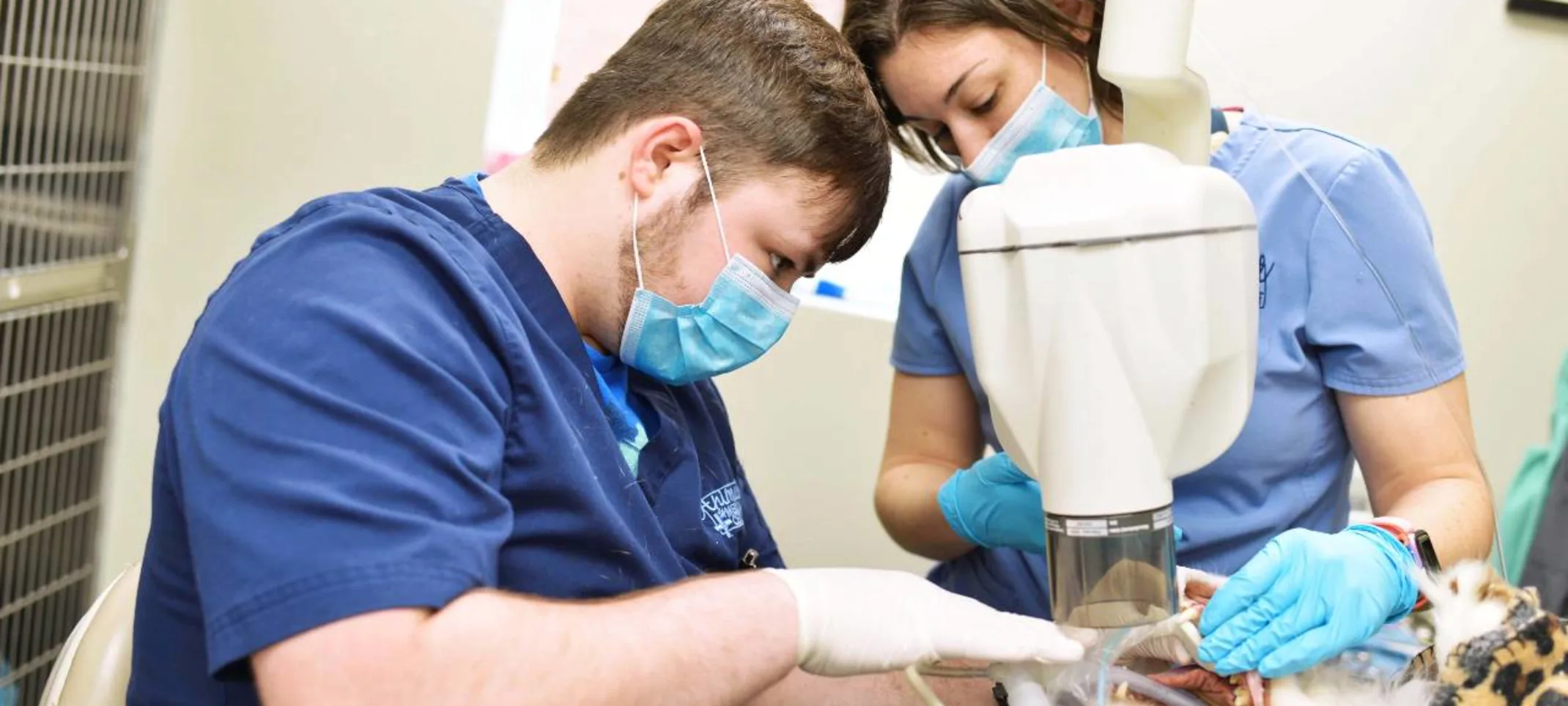Animal Medical Center of Hattiesburg
Overview
Studies show that 50% of all dogs and cats have some form of periodontal disease. That number jumps to 80% in pets that are 3 years of age or older. If left untreated, periodontal disease can cause infection, pain, and tooth loss over time. It can also lead to serious health problems like microscopic changes in the heart, liver, and kidneys. Because of this, we recommend an annual veterinary dental healthcare examination for all pets.
Why do pets need dental care?
Many health problems start in the mouth. Plaque, tartar, periodontal disease, and infected teeth serve as a source of inflammation and infection for the rest of the body.
Dental disease is one of the most common problems that we see in dogs and cats. It can cause drooling, reluctance to eat, swelling, bad breath, redness of the gums, loose teeth, and tooth discoloration.
When should I seek dental care for my pet?
Dental issues and dental related diseases can easily be prevented by visiting our veterinarians regularly for dental examinations and cleanings. We take a comprehensive approach to dental care including dental health assessment, treatment, and prevention.
How does it work?
Teeth Exams, Cleaning and Polishing
Dog and cat dental cleanings are very similar to human dental cleanings, except that we are required to use anesthesia to properly and safely examine and clean the teeth. After the cleaning, our veterinarians perform a thorough oral exam and check for signs of disease like gum loss, root exposure, or pockets around the root.
Also similar to human dentistry, we do full mouth radiographs (x-rays) of your pet. This allows our veterinarians to be able to evaluate the roots of your pet's teeth as well as any disease or abnormalities that are located below the gum line and not visible on examination alone.
Tooth Extractions
We make every effort to save teeth that we feel have a chance to be successfully treated. In many circumstances, however, periodontal disease is so advanced that treatment without extraction is unsuccessful. We only extract teeth that in the doctor's opinion are beyond saving.
Minor Oral Surgery
Many teeth require oral surgery to safely remove each individual root. We have extensive training and experience to perform these procedures properly. Pain medications are administered in clinic and provided for in-home aftercare.
Major Oral Fracture Repair
If your pet suffers a jaw injury that can’t be corrected with other treatments, surgery may be necessary. Our veterinarians can repair minor cracks or severe mandible breaks with surgical procedures.
Oral Tumor Surgery
Our team can provide surgical treatment to remove benign or malignant tumors in your pet’s mouth. Your veterinarian will perform diagnostic scans and decide which course of action is best for your pet.
Palatal Defect Surgery
Just like humans, dogs and cats can be born with a cleft palate, also known as a palatal defect. To prevent infection or other health concerns, we can repair your pet's palatal defect with surgery.
Basic and Advanced Periodontal Treatment
Our pets can suffer from gum disease much like us! To prevent further health issues, we offer periodontal treatment services to treat pets with early to advanced stages of periodontal disease.
Root Canal Therapy
Root Canal Therapy is a less painful alternative to tooth extraction. If your pet suffers from a broken tooth, this procedure will remove the infected tissue of the canal and replace it with dental material.
Crown Therapy
Dental crowns aren't just for humans! Pets with broken or fractured teeth can get dental crowns, which will allow them to chew comfortably and prevent further injury.
Orthodontics
Sometimes misaligned teeth can cause issues with your pet's bite and how they chew. We offer orthodontic services to help ease any issues with their bite to prevent pain or injury.
Dental Procedures Performed by Billy Scott, DVM
Periodontics
Closed and open root planing with subgingival curretage
Perioceutic application
Bone grafting of 3-walled pockets
Guided tissue regeneration
Gingivectomy
Type I and II Crown Lengthening
Apical repositioning flap
Lateral sliding flap
Endodontics
Standard (orthograde) root canal therapy
Surgical (retrograde) root canal therapy
Vital Pulpotomy
Restoratives
Class I-VI restoration
Restoration of endodontic procedures
Class V subgingival restoration
Repair enamel defects
Oral Surgery
Simple and complicated extractions
Repair of oronasal fistula
Repair of palatal defects
Surgical oncology
Mandibulectomy (rostral, en-bloc, total)
Maxillectomy (rostral, en-bloc)
Mandibular Rim Resection
Tonsillectomy
Lymph node biopsy (mandibular, parotid, retropharyngeal)
Orthodontics
Interceptive orthodontics
Interdental wiring and acrylic splinting of maxillary and mandibular fractures
Maxillary incline plane
Maisel Chain Placement for Mesioverted Canines
Maxillary arch bar
Maxillary expansion device
Prosthodontics
Crown preparation and placement for full coverage and ¾ crowns

